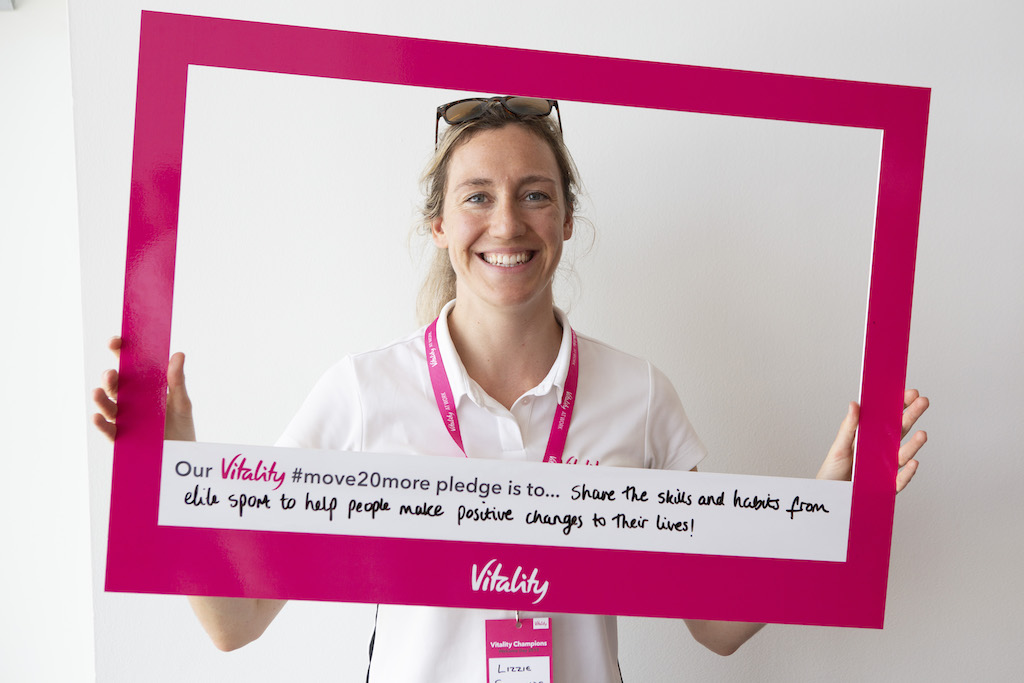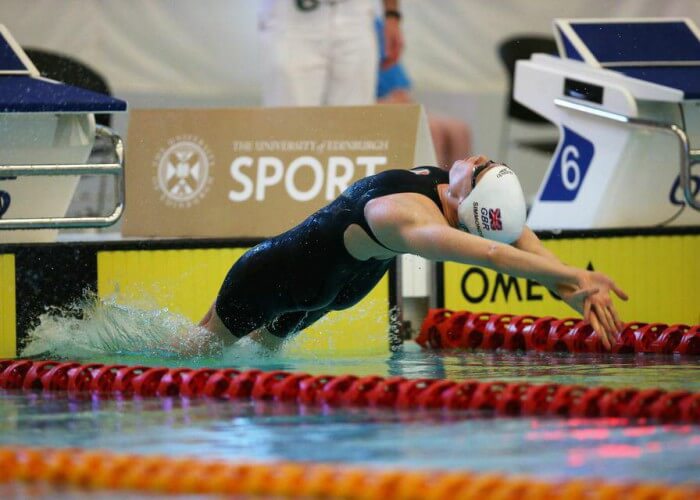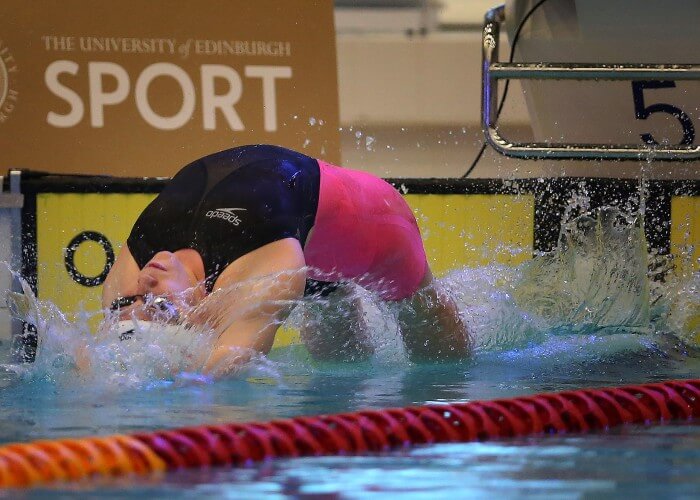2020s Vision – The Shift In Swimming Culture Rippling Out To Corporate Classrooms

“I was stuck, where a lot of people get stuck, thinking that by feeling like this or blaming other people, it would somehow change the outcome … Maybe 18 months to two years after the race I had a significant realisation that I was was making a conscious decision to focus on what I’d missed out on, instead of the incredible experience and achievement that I now take pride in. It just took me a bit of time to gain some perspective and realise it was actually the most incredible experience of my life and I’m so fortunate to have competed at a home Games. To feel privileged rather than unfortunate was a major shift.”
- So says Lizzie Simmonds, former European Champion and Olympic teamster for Britain, raising awareness of mental health, healthy outlooks and her new role as a ‘performance champion’ sharing lessons learned in swimming with company workforces and others embracing a ‘healthy minds, healthy staff, healthy culture and company’ philosophy.
Take the Director’s Cut, writes Craig Lord: draw back, upwards and let the lens pan out to a panoramic view of a swim meet. What do you see and hear? Yes there are, lanes full of swimmers, coaches on the deck giving instructions, officials, kit, water bottles, conviviality, rivalry, the processes on the pathway to goals set, the cheers, the crowd, smiles and sometimes tears, the flags, the blocks, goggles and the scoreboard seen through them – and the thing Americans more than others call a psyche sheets.
To others, that’s the start sheet, the lists and line-ups of swimmers, their entry times, the information a swimmer needs to know which lane in which heat he or she will race in – and who’ll be racing next to them. Psyche sheet?
The name indicates that it’s more than “a ranking of swimmers by event and time” described in several swim lexicons. It’s a tool to help the swimmer “psyche” themselves up for the effort ahead, be that one of self-improvement, getting your hand to the wall before anyone else – or both.
The mind is not as visible as at a swim meet but it’s just a big a presence as the hand and arm that pull, the leg that kicks, the hip that drives, the core that counts.
In our 2020s Vision series, we took up the second theme in a year-long look at the challenges ahead for the sport of swimming in the decade ahead when we considered the topic of Shane Gould’s doctorate: ‘swimming culture’. That’s to say, the ideas, customs, and social behaviour of swimmers and others involved in what they consider to be ‘swimming’. The mind is key, in positive and negative ways that require deeper understanding.
The qualities of the champion as perceived far and wide leave little room for consideration that the Olympic champion rocketing down the pool might actually be going through hell. No, not the ‘no pain,-no gain’ stuff, rather the mental-health issues Ian Thorpe, Grant Hackett, Michael Phelps, Allison Schmitt, Susie O’Neill, as well as coaches such as Leigh Nugent and academics such as Marte Bentzen, of The Norwegian School of Sport Sciences, have raised.
Of late, USA Swimming has acknowledged mental health as a critical aspect of swimming culture overlooked for too long. The very raising of awareness in all the above marks a significant shift in culture in the sport of swimming.
Each experience in the list above is unique yet red threads are tangible, including one labelled ‘Career Transition and how to look back on a career in a healthy way before finding new purpose and motivation in life’.
Here, Lizzie Simmonds, in her new role as a Vitality performance champion, talks to guest writer Matt Davies about aspects of ‘swimming culture’ that are at last being drawn into the light to the benefit of swimmers and many others beyond the pool.

Lizzie Simmonds – Photo Courtesy: Ian MacNicol
Lizzie Simmonds, in common with many elite level athletes, followed a familiar path to success: focus, determination and sacrifice, as the script of champions would have it.
She was European 200m backstroke champion, claimed medals for Britain and England at World short-course and Commonwealth levels, won 13 British titles and broke British, Commonwealth and European records in an illustrious career that spanned 15 years from performance director Bill Sweetenham‘s “Smart Track” squad to international podium.
Simmonds was 17 when she raced at her first Olympics, Beijing 2008, four years out from a home Games in London. Lots of highs – and inevitable lows along the way. Both shaped her, not just in the swim but in life, too – but only after reflection and a process of steadily being able to look back on her career and see it in new light. She says:
“The biggest lesson that I learned in resilience and navigating disappointment was the London Olympics in 2012. I came fourth (200m backstroke) and for a long time I saw it as a failure and really struggled with it.
“It had been an amazing experience and undoubtedly the highlight of my life. I competed at a home Games with the crowds cheering for me, but I still saw the race as a failure and it really painted my reflection of that competition.”
Simmonds kept her thoughts to herself, even at a time – or perhaps because of a time – when she was continuously provided with praise and support. She said:
“I just didn’t know how to get out of that headspace. I was stuck, where a lot of people get stuck, thinking that by feeling like this or blaming other people, it would somehow change the outcome. That’s just not realistic and you can’t go back in time. Maybe 18 months to two years after the race I had a significant realisation that I was was making a conscious decision to focus on what I’d missed out on, instead of the incredible experience and achievement that I now take pride in.”
Simmonds realised that she was responsible for making this choice, a key mindset shift she carried into the rest of her career and now life beyond racing.
“It just took me a bit of time to gain some perspective and realise it was actually the most incredible experience of my life and I’m so fortunate to have competed at a home Games,” Simmonds explained. “To feel privileged rather than unfortunate was a major shift.”
Four years after London, Simmonds fell just shy of making the time cut for the Rio Olympics, her status as Britain No1 not enough to secure her selection: she won the 200m at British trials (in 2:09.24) but was second behind Georgia Davies in the 100m, the medley relay berth gone too.
Simmonds might have quit right there and then but Simmonds waited until after her third and final appearance at the Commonwealth Games in 2018 before hanging up her cap and goggles for good.

Lizzie Simmonds – Photo Courtesy: Ian MacNicol
She was 27 and her teammates had jokingly started to call her Grandma. In retirement, Simmonds was faced with a new and entirely different set of challenges.
She said: “There are definitely challenges with identity. You class yourself as an elite athlete for so long and then suddenly you can’t call yourself one anymore. You start asking ‘who am I?’
“I’d had a very single defined purpose for a long time and suddenly I had lots of perhaps slightly lesser purposes in very different directions, but I didn’t feel as motivated to any of those things. When you leave a sport, you almost do feel like you’re losing that [identity], but it will always be a part of my story. No one will ever take away the fact that I went to two Olympic games. I will always be an Olympian.”
Simmonds now switches her attention away from her own success, utilising the experience she has gained to help others, both in and out of sport. She spends much of her time performance consulting, often mentoring young athletes as well as working with schools, clubs and sports organisations.
Her work has just been extended to the corporate sector: Simmonds has teamed up with the health insurance company Vitality and the workplace wellbeing programme it set up in 2018 just as the swimmer’s career was drawing to a close. The aim of the scheme is to help businesses build healthier, more engaged and productive workforces.
As one of the scheme’s ‘performance champions’, Simmonds delivers workshops to workforces. “As athletes, we really have to optimise every aspect of our health and wellbeing. You have to optimise your nutrition, your mental health, psychology, sleep and recovery,” says Simmonds.
“I think initially when I go in and talk [to company workers], people don’t think they will be able to relate as they’re not an elite athlete and can’t put themselves in that mindset. Actually, the physiological responses that we get as human beings are exactly the same.
“Despite the differences, people experience exactly the same type of stress or anxiety. The best part of the work is when people get that ‘aha’ moment, that moment of ‘oh my god that completely applies to me and that’s going to impact my life’.”
“Most people cannot relate to competing at the Olympic Games and dealing with that pressure, but they can relate to standing in front of an interview panel or promotion panel or giving a presentation that they’re not used to doing.”
Simmonds speaks to a number of people in widely varying occupations in her role with Vitality. No two sessions are quite the same.
“Sometimes we talk about high pressure and high stress. Others want to talk about nutrition and how to manage it if you’re sat at your desk all day,” Simmonds said.
“Others want to talk about exercise or about mental health and making sure you get time away from the office and get some headspace.”
Perception of Failure
Simmonds uses her own experience to help change perceptions of “failure”. She said:
“Failure is a very negatively charged word and people are often very scared of failing, but the reality is that success – including sporting success – comes from a series of mini failures. It’s strange that we try to avoid failure at any costs. The reality is that without it, we’d likely live a very average life. It can be very powerful to take that fear away from people.”
Simmonds is among drivers of a programme now in its second year. For the swimmer turned thinker, the sport in which she excelled has much work to do yet when it comes to shifting culture in the interests of improving mental health. She says:
“I still do think that there’s more that needs to be done in understanding why athletes are so vulnerable. There are many athletes coming out of sport with devastating mental health problems and there has to be a lot more support in that area.
“A lot of it is from the individuals, not necessarily from society, coaches or staff. It’s often the athletes that cannot admit this openly. They live in a world where showing physical dominance and performing better than everyone around them is what they do. To be vulnerable is just not an option.”
Simmonds believes there is a need to continue to build channels of communication for athletes, leading them to good guidance if they are experiencing problems. That may have been lacking in the past, she believes, but there are signs that the sport is now heading in the right direction.
In this first quarter of the new decade and 2020, we will consider the following themes:
- The Athlete Voice (a theme that will run throughout the year)
- Swimming Culture – what is it?
- Gender Vs Sex: a waking nightmare for women’s sport?
The Athlete Voice:
- Matt Biondi’s Mission To Enrich & Educate Swimmers
- ‘Alliance’ Not ‘Union’ Aims To Take ISL Model To Multi-Sports ‘Games Of Magic’
- Athlete Voice Needs Coach Voice Of Experience, Reason, Objectivity, Says Rudd
- Lessons From Pro-Sports As Swimmers Frame Their Future
Swimming Culture:
Dr. Shane Gould On Swimming Culture After A Lifetime Of Learning
Do you have a contribution to make, a topic to suggest within the frame of the themes we are looking at this quarter? Your views on any theme can be left in the comments field at the foot of any article, while those who want to reach out with suggestions to the editorial team can contact us at editorial@swimmingworld.com.



